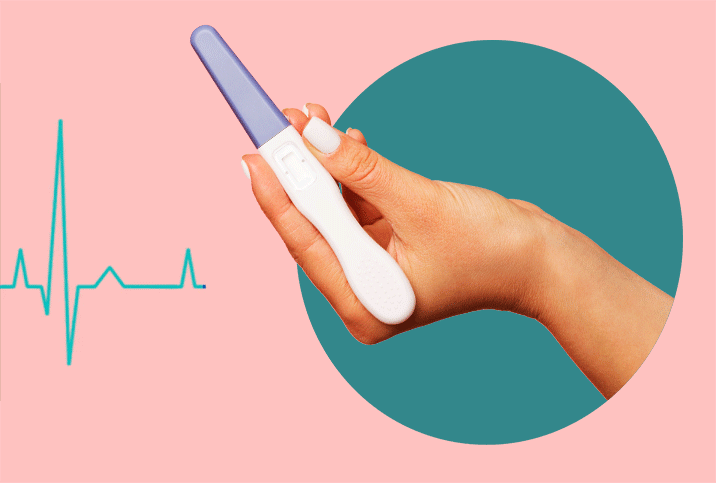False Positives For Pregnancy Can Occur Following Hysterectomy

A woman without a uterus takes a urine pregnancy test and it comes back positive. She goes to the doctor, who doesn't believe her and runs the test again. Same results. And no, this isn't the start of a joke, but rather a rare occurrence.
Why take a pregnancy test after a hysterectomy?
Even after hysterectomy or menopause, women may experience "pregnancy-like" symptoms that lead them to take a pregnancy test—just in case.
Brian Levine, M.D., one of the nation's leading fertility experts, told us it's common for women going through perimenopause to confuse their symptoms with pregnancy.
"Given that menopause is typically defined as a lack of menses, many individuals at the end of their reproductive windows may experience amenorrhea (lack of period) earlier than 51 years old [if she had a hysterectomy]," he said. "Missing a monthly period might have previously been the first sign of pregnancy, [but] in reality, their body is transitioning into a menopausal hormonal profile. Furthermore, many of the symptoms of pregnancy and perimenopause are similar (breast swelling/pain, mood changes, fatigue, sleep changes, bloating, hot flashes)."
How false-positive test results occur
Urine pregnancy tests determine pregnancy based on the presence of a hormone called hCG, or human chorionic gonadotropin. HCG, often called the "pregnancy hormone," is primarily produced by cells formed in the placenta.
Levine explained that despite its moniker, hCG can be produced outside of pregnancy.
"This can be the result of having interfering antibodies that are causing a false-positive test, tobacco and marijuana have been described as causing low levels of hCG, and even some medications can cause a falsely elevated hCG." Small amounts of hCG can also be released by the pituitary glands, liver and colon.
HCG levels only need to be above 5 mIU/mL (5 milli-international units per milliliter) to fool an at-home urine test. When someone is actually pregnant, their hCG levels can double in as little as 96 hours. By five weeks, the expectant mother's hCG levels should be at least four times as high as the lowest amount a pregnancy test detects. If the pregnancy lasts to term, the hCG levels can be as high as 117,000. So, it doesn't take much of the hormone to trigger a false positive.
When high hCG levels signal something more serious
While false positives may be the result of something minor, it could instead be a sign of a serious issue, said Shari Lawson, M.D., a Johns Hopkins assistant professor.
"Elevated hCG levels in non-pregnant women (or men) is most likely due to benign or cancerous tumors. Choriocarcinoma and germ cell tumors are gynecological tumors that secrete hCG. If a non-pregnant woman has an elevated hCG or positive pregnancy test, she should be evaluated for a tumor."
One study found elevated hCG levels were present in 45 percent to 60 percent of biliary and pancreatic cancer patients, and 10 percent to 35 percent of most other cancer (such as lung, breast and prostate) patients.
'If a non-pregnant woman has an elevated hCG or positive pregnancy test, she should be evaluated for a tumor.'
In very rare cases, levels of hCG may indicate an ectopic pregnancy.
"After a partial ovariectomy or any ovarian surgery, if viable ovarian tissue remains, the patient may ovulate," Lawson said. "In a normal pregnancy, the fertilized egg travels down the tube to the uterus, where it implants."
In an ectopic pregnancy, the fertilized egg implants in the tube on its way to the uterus. An ectopic pregnancy is a life-threatening condition. Fallopian tubes are not flexible enough to expand around a growing fetus and can burst, causing internal bleeding.
Because elevated hCG levels could indicate an ectopic pregnancy or a cancerous tumor, it's important to be evaluated by your doctor immediately after a positive pregnancy test result.


















